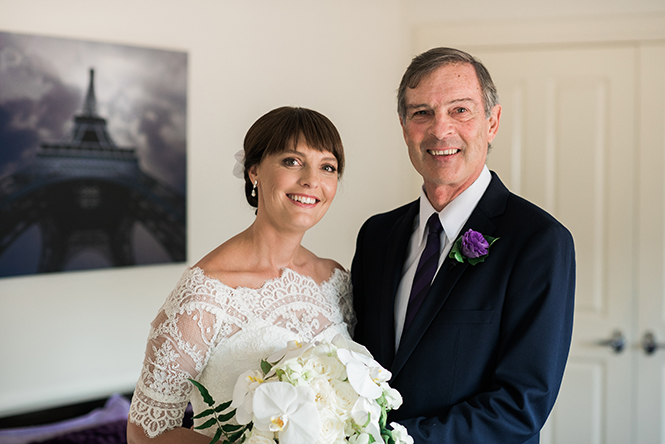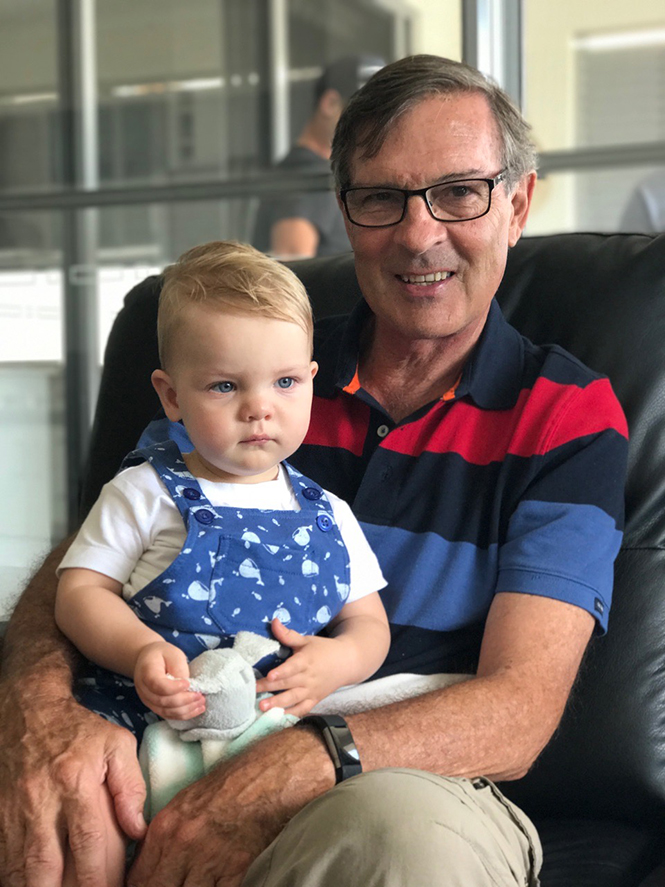
Michelle with her late father, Edward, on her wedding day.
A cancer diagnosis is one of the most difficult things a person could have to face. But cancer can still touch you even if you aren’t the one with the disease. One of the hardest things people close to the patient may have to cope with is the process of grieving after losing their loved one to cancer.
Michelle understands this process well. She lost her dad, Edward – a high school principal, father of four and grandfather of seven, including Michelle’s two-year-old son, Ted – in November.
“The cancer journey is tough for everyone,” Michelle said. “I still feel it now, but I felt quite uncertain about the future after Dad died.
“A lot of people say to take each day as it comes, but I was a bit uncertain about what tomorrow would bring.”
While grief is a normal response to loss, which everyone experiences in their own way, it can be a very difficult process. Your gradual adjustment to loss has no set time frame and is often confusing. But with time and support, you can find your way forward.
Finding meaning in grief
One thing Michelle and her family did to help with their grief was try to create something positive from her dad’s experience.
Edward’s enthusiasm to support cancer research and help others in his situation led Michelle to set up an online In Memory page through Cancer Council’s website, encouraging donations in lieu of flowers.
An In Memory page is a way to create a special tribute to a lost loved one which family and friends can visit, contribute messages and donate to in support of cancer research.
“Dad was keen that if the money raised could go towards easing that toughness for other people then that would be fantastic,” Michelle said, adding that it also comforted her in a difficult time.
“It was definitely nice to know that this was something Dad wanted. I set it up two days after Dad died. There was a lot of stuff going on then, but that was one positive thing I could do.”

Precious memories – Ed with one of his seven grandchildren, Jacob.
The In Memory page was an especially fitting tribute to Edward, who had been involved with Cancer Council before. He once even dyed his hair blue after challenging staff and students to raise $1,000 for cancer research.
“He got to the $1,000 very quickly!” Michelle said.
Michelle also said the page was a simple and straightforward step for her, her three siblings and her stepmother to do while dealing with the immediate grief following Edward’s death.
Michelle said many of their friends and family welcomed the chance to make a tribute.
“I found it really easy,” she said. “The hardest thing was getting a photo of Dad that we all agreed on.
“We certainly got positive feedback on it from immediate family and others, that they got the opportunity to extend the meaning of his life beyond his life.”
Coping with grief is different for everyone
Grief isn’t just sadness – it often involves a complex range of reactions and emotions which can seem overwhelming at times, and people cope in different ways.
It’s important to be patient with grief and accept that your feelings are normal. There are many things you can do to help yourself through this process: Set a manageable daily routine; do something you enjoy each day, like listening to music or taking a hot bath; speak to a psychologist; take a walk outside to care for your physical wellbeing; and get support if you need it, either from family and friends, or by reaching out to Cancer Council’s nurses on our 13 11 20 information and support line.
Our experienced and compassionate nurses can help you find a support group so that you can share your experience with others facing a similar situation. There are also Cancer Council events where people who have been touched by cancer can come together, such as the Memorial Evening. This event gives people who have lost someone to cancer the chance to stand alongside one another and light candles in honour of their loved one, uniting in a moving tribute.
Coming together with others who have experienced similar situations can be a powerful and therapeutic experience. The inaugural Memorial Evening, planned for 16 April, was hoped to do just this, but sadly was cancelled due to the high risk to public health currently posed by COVID-19, or coronavirus. We hope that next year’s Memorial Evening can help people cope with the grief of losing a loved one.
It's important to find what works for you in the grieving process. For Michelle, one part of that was making her father’s In Memoriam page.
“It’s up to personal preference, but we certainly found it really worthwhile,” she said. “Cancer is tough for everyone, but it was nice to be able to say that this was something Dad wanted to do. His life had a lot of meaning, and this makes sure his death had meaning too.”
If you or someone you know is coping with grief after losing a loved one, please contact Cancer Council’s experienced and compassionate nurses on 13 11 20, or visit cancervic.org.au/get-support for more information.
If you are interested in attending next year’s Memorial Evening, please contact us at 1300 65 65 85 or supportercare@cancervic.org.au for more information.